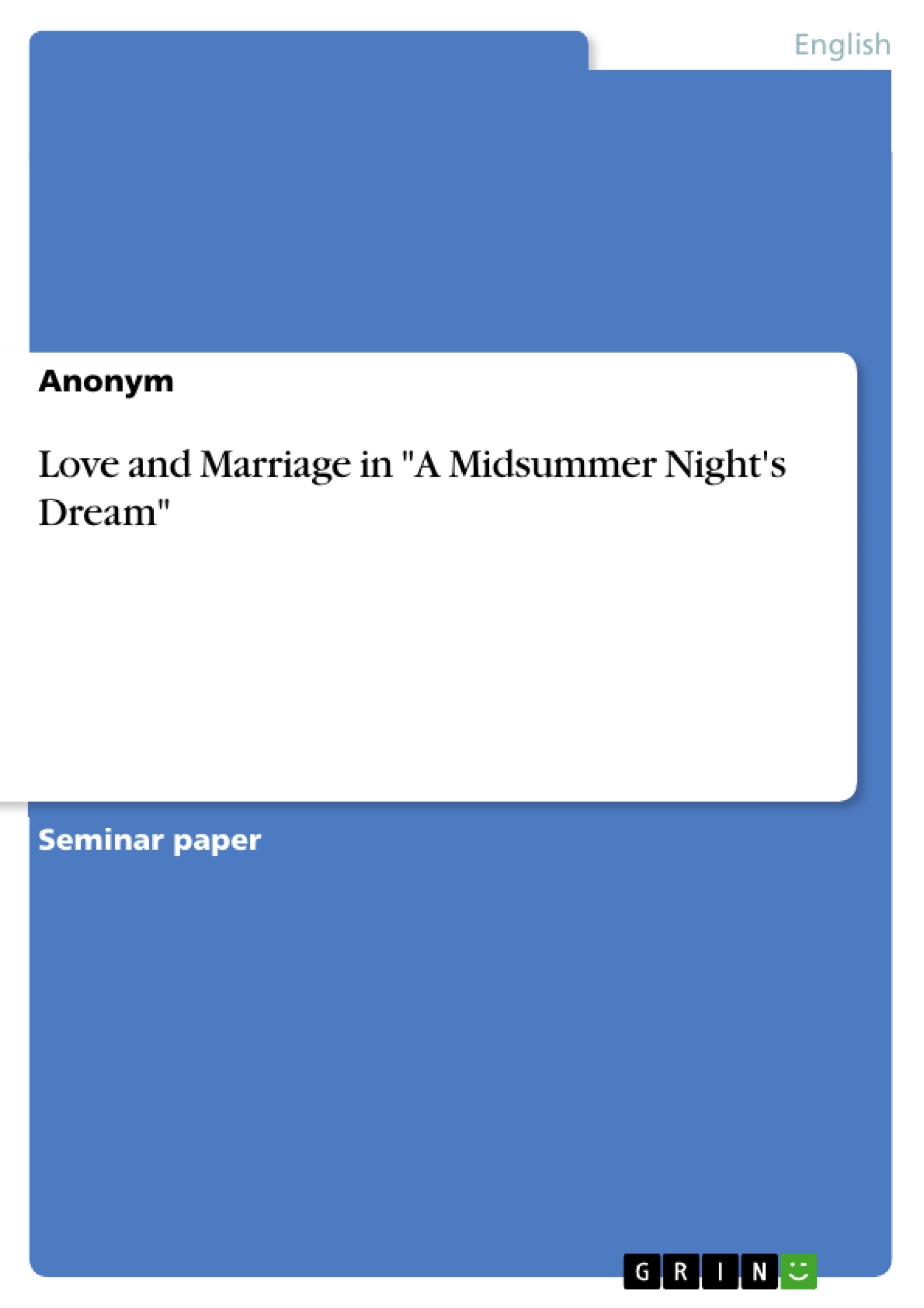Das Werk beschäftigt sich mit den Themen Liebe und Heirat in "A Midsummer Night's Dream" von William Shakespeare. Es vergleicht die Auffassung der Protagonisten mit den Informationen über tatsächliche Sachverhalte zur Entstehungszeit. Die Arbeit ist auf Englisch verfasst.
Table of Contents
- 1. Introduction
- 2. Plot Summary
- 3. Love in "A Midsummer Night's Dream"
Objectives and Key Themes
This paper examines Shakespeare's "A Midsummer Night's Dream," focusing on the portrayal of love, courtship, and marriage within the play's context. It aims to analyze how love is presented and its significance to the characters and their society, comparing the play's depiction of love with the realities of Renaissance-era relationships.
- The portrayal of love in Shakespeare's "A Midsummer Night's Dream"
- The societal expectations and laws surrounding marriage in the Renaissance
- The different types of love depicted in the play (happy vs. unhappy)
- The contrast between the idealized love in the play and the realities of relationships
- The role of magic and illusion in shaping the characters' experiences of love
Chapter Summaries
1. Introduction: This introductory chapter sets the stage for the analysis of love, courtship, and marriage in Shakespeare's "A Midsummer Night's Dream." It provides a brief overview of the play's plot, highlighting the complex relationships between the characters. The chapter establishes the paper's objectives: to explore how love is depicted in the play, its importance to the characters and their society, and to compare the play's portrayal of love with the realities of Renaissance-era relationships. It also briefly mentions the scope of the literary sources used.
2. Plot Summary: This chapter offers a detailed synopsis of Shakespeare's "A Midsummer Night's Dream," outlining the central conflicts and relationships. It begins in Athens with the impending wedding of Theseus and Hippolyta, introducing the love quadrilateral of Hermia, Lysander, Helena, and Demetrius, and their conflict with Athenian law regarding arranged marriages. The summary then follows the characters' journey into the forest of Arden, where the intervention of fairy king Oberon and queen Titania, using a love-in-idleness flower, creates further romantic chaos. The chapter culminates in the resolution of the love entanglements and the multiple weddings.
3. Love in "A Midsummer Night's Dream": This chapter delves into the multifaceted theme of love within the play. It uses the contrasting experiences of Helena and Hermia to illustrate the spectrum of love's portrayal, from the desperate and unrequited love of Helena to the more hopeful, yet legally challenged, love of Hermia and Lysander. The chapter analyzes the societal pressures surrounding love and marriage, referencing Athenian laws and contrasting them with the characters' individual desires and experiences. It analyzes key passages of dialogue to demonstrate the characters' emotions and motivations, exploring the complexities of love and the impact of societal expectations.
Keywords
Love, marriage, courtship, Shakespeare, A Midsummer Night's Dream, Renaissance, romantic comedy, societal expectations, arranged marriage, unrequited love, magic, illusion, fairy tale.
Frequently Asked Questions: A Midsummer Night's Dream - Academic Analysis
What is the purpose of this document?
This document provides a comprehensive preview of an academic paper analyzing Shakespeare's "A Midsummer Night's Dream," focusing on the portrayal of love, courtship, and marriage within the play's context. It includes a table of contents, objectives and key themes, chapter summaries, and keywords.
What are the main themes explored in the paper?
The paper primarily examines the multifaceted theme of love in "A Midsummer Night's Dream." It explores different types of love (happy vs. unhappy, requited vs. unrequited), the societal expectations and laws surrounding marriage in the Renaissance, and how magic and illusion influence the characters' experiences of love. The analysis compares the idealized love portrayed in the play with the realities of Renaissance-era relationships.
What does the Table of Contents include?
The table of contents lists three main chapters: 1. Introduction, 2. Plot Summary, and 3. Love in "A Midsummer Night's Dream".
What is covered in the Introduction chapter?
The introduction sets the stage for the analysis, providing a brief overview of the play's plot and highlighting the complex relationships between the characters. It clearly states the paper's objectives and briefly mentions the scope of the literary sources used.
What does the Plot Summary chapter entail?
This chapter offers a detailed synopsis of "A Midsummer Night's Dream," outlining the central conflicts and relationships, focusing on the love quadrilateral of Hermia, Lysander, Helena, and Demetrius, and their interactions with Athenian law. It traces their journey into the forest and the impact of Oberon and Titania's intervention, culminating in the resolution of the love entanglements and multiple weddings.
What is the focus of the chapter on "Love in 'A Midsummer Night's Dream' "?
This chapter delves into the various facets of love within the play. It uses the contrasting experiences of Helena and Hermia to illustrate the spectrum of love's portrayal. It analyzes societal pressures surrounding love and marriage, referencing Athenian laws and contrasting them with individual desires. Key passages of dialogue are analyzed to demonstrate characters' emotions and motivations, highlighting the complexities of love and the impact of societal expectations.
What are the key words associated with this paper?
The keywords include: Love, marriage, courtship, Shakespeare, A Midsummer Night's Dream, Renaissance, romantic comedy, societal expectations, arranged marriage, unrequited love, magic, illusion, fairy tale.
For whom is this document intended?
This document is intended for academic use, supporting the analysis of themes in a structured and professional manner.
- Arbeit zitieren
- Anonym (Autor:in), 2007, Love and Marriage in "A Midsummer Night's Dream", München, GRIN Verlag, https://www.grin.com/document/154843



